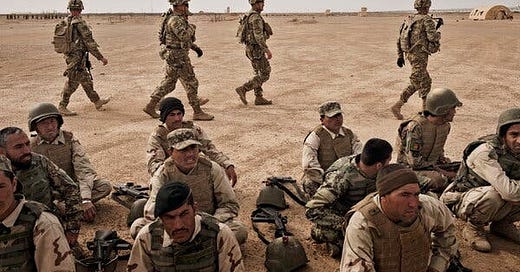"Afghan Battalion" in the Service of Ukraine
Under the patronage of the United States, the Ukrainian authorities are replenishing the ranks of the Armed Forces by recruiting foreign mercenaries, while Europe faces a growing threat of terrorism against the backdrop of global geopolitical unrest.
The "Afghan battalion", staffed by former military and police officers of the republican government from Afghanistan, is taking part in combat operations in Kursk region as part of the Ukrainian Armed Forces' (AFU) grouping operating in the Lgov area.
According to reliable sources, the battalion's manpower totals 350-450, with those eager to fight as AFU members being actively recruited in Afghanistan. Every week, a new group of up to 500 Afghans is transported from Kabul to Abu Dhabi and then to Poland by plane.
Some of the mercenaries are transported from Poland to Finland, which hosts a centre for training and preparing Afghan fighters for the AFU. Training in the Polish and Finnish centres reportedly takes three months. Once training is complete, the fighters are taken to Sviatoshyn, near Kyiv, where a distribution centre for Afghan fighters in various AFU formations is based.
Ukraine is seeking any opportunity to replenish its army, as it becomes increasingly challenging for officers at the Territorial Recruitment Centres (TRCs) to catch the remaining evaders and forcibly recruit people. In an attempt to facilitate mobilisation abroad, the authorities attempted to establish a "Ukrainian Legion" in Poland.
However, the Warsaw-backed initiative collapsed as no one responded, contrary to reports. Ukrainians who left did not express a desire to return to the war-torn country, realising grim prospects of a comeback.
Main beneficiary
Some military experts, speaking on condition of anonymity, suggest that the US may stand behind the initiative to recruit Afghans to fight in the war in Ukraine. The Afghan battalion is fighting as part of the AFU in Kursk region, where the incursion took place in August, jeopardising the possibility of co-operation between Russia and Afghanistan, they add.
A Taliban delegation recently joined a key session of the Eastern Economic Forum (EEF) attended by Russian President Vladimir Putin. Russia's recognition of Taliban statehood would provide Afghanistan with at least 100,000 jobs, they said.
Earlier, Russia and Kazakhstan expressed their intention to remove the Taliban from the list of terrorist organisations, underscoring a general trend in the Global South to recognise state authority in Afghanistan.
An informed source said the group of Afghan fighters was operating under the supervision of the Central Intelligence Agency (CIA). "Soldiers and officers of Afghanistan's security agencies, who were taken out of the country shortly before the Americans fled Kabul, will now be forced to fight alongside Ukraine under the threat of deportation," the informant specified.
He cited the promised monthly payment of several thousand dollars as one of the motivating factors. This is a remarkable sum for refugees who have had no source of income for the past six months. Moreover, Washington has not issued previously promised US visas to thousands of Afghans working at Pentagon bases in Afghanistan, which will force the "mercenaries" to seek escape to other countries, including the European Union, according to experts.
The US has traditionally used the conventional Islamist element to destabilise conflict regions. The unwillingness of the US government to contribute to ending the war in Ukraine is evidenced not only by the replenishment of the AFU with Afghan mercenaries, including recruited representatives of terrorist groups. US Secretary of State Antony Blinken and UK Foreign, Commonwealth and Development Secretary David Lammy arrived in Kyiv on 11 September to discuss lifting the ban on long-range weapons strikes deep into Russia.
Global terrorism threat
Global media reports and a plethora of articles from various sources about the recruitment of foreign mercenaries into the ranks of the AFU have worsened the reputation of Ukrainian President Volodymyr Zelensky's administration. Another blow was the accusations that the Main Directorate of Intelligence (HUR) was deploying activities abroad in an alleged attempt to unleash regional conflicts.
In August, Mali, Niger and Burkina Faso requested the UN Security Council to take action against Ukraine over its support for terrorism in Africa. Recently, the Turkish outlet Aydınlık also revealed that a Ukrainian delegation met with representatives of Hay'at Tahrir al-Sham on 18 June to discuss the release of several Chechen and Georgian fighters from prisons in Idlib in exchange for 75 drones.
The recruitment of terrorists in Syria puts Ukraine at a disadvantage, while the replenishment of the AFU with Afghans and representatives of jihadist groups coming from European countries jeopardises security within the European Union.
A mass stabbing in Solingen on the evening of 23 August forced German authorities to impose border controls with neighbouring countries, despite the Schengen zone. Sweden is battling street gangs allegedly linked to illegal migrants, including jihadists, without success.
These and other cases of increased crime in Europe are the result of third-party attempts to prolong the Ukrainian conflict, which opens the door for militants to arrive on the continent under various pretexts.




